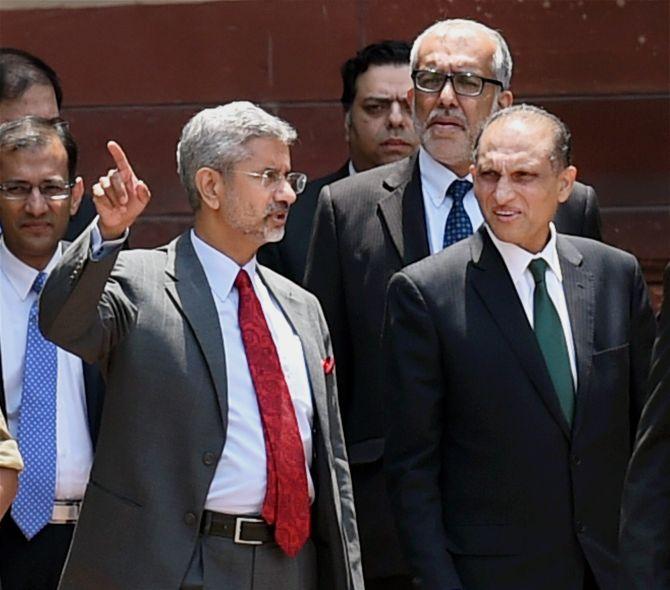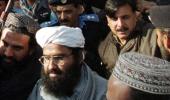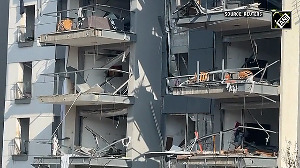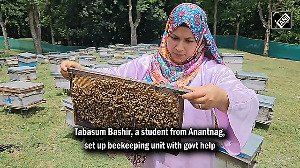'The Modi government knows that much cannot be expected of Pakistan till the Kulbhushan Jadhav issue is resolved,' says Rajeev Sharma.
 The Narendra Modi government still has stars in its eyes in its dealings with Pakistan despite no concrete action on the ground by Islamabad that justifies New Delhi's optimism.
The Narendra Modi government still has stars in its eyes in its dealings with Pakistan despite no concrete action on the ground by Islamabad that justifies New Delhi's optimism.
Is it genuine optimism on the Modi government's part? Or is it a put on show considering that a government which has made such a huge political investment in reaching out to Pakistan can hardly do anything else?
Two key government officials expressed optimism about the India-Pakistan engagement last week.
Ministry of External Affairs spokesman Vikas Swarup, in his weekly briefing on April 28, described the April 26 talks between the foreign secretaries of India and Pakistan in New Delhi as 'positive' and 'frank, but constructive.'
This is what the MEA spokesman said: 'I think the very fact that the two foreign secretaries met, you know there was speculation for a long time, is the dialogue process between India and Pakistan suspended, are the foreign secretaries never going to meet and things like that.'
'So the very fact that they met, I think has the message in itself. Both sides have described the meeting as "frank, but constructive." You would have seen the comments made by the Pakistan foreign secretary and he also described the talks as being positive, we also would use the same adjective to describe the talks.'
A day later, National Security Advisor Ajit Doval met six former Pakistani high commissioners to India -- Humayun Khan, Riaz Khokhar, Ashraf Jehangir Qazi, Aziz Ahmad Khan, Shahid Malik and Salman Bashir -- and expressed satisfaction at the Pakistani Joint Investigation Team that visited India a month ago.
Doval and Swarup's observations should be seen as diplomatese and nothing more.
The truth is gradually sinking in as far as the Modi government is concerned that Pakistan is proving a much harder nut to crack than it had previously imagined.
When Modi stunned the world by suddenly diverting his home-bound plane from Kabul to Lahore on December 25 to greet his Pakistani counterpart on his birthday to launch his government's most decisive peace effort vis-a-vis Pakistan, the Kulbhushan Jadhav episode had not occurred.
The dynamics have now changed substantially with the 'arrest' of Jadhav, a former Indian Navy commander who has been accused by Pakistan of being a Research and Analysis Wing spy.
The Pakistanis are currently on an overdrive in major world capitals trying to project how India fans terrorist and subversive activities against Pakistan, showcasing Jadhav to the international community to that end.
The Modi government now knows that much cannot be expected of Pakistan till the Jadhav issue is resolved. But how to do it?
The Modi government can do precious little as all the levers are in Pakistan's hands as far as the Jadhav episode is concerned.
Though it is not know when Jadhav was 'arrested' in Balochistan, the development first came to light in March. Since then the India-Pakistan peace process has been headed nowhere despite India permitting the Pakistani JIT to visit the terror-hit Pathankot airbase.
But there are still some bright spots in the India-Pakistan engagement. First, the two foreign secretaries did meet, even if the meeting was on the sidelines of a multilateral event, he Heart of Asia conference on Afghanistan.
The fact that the two foreign secretaries met punctured the claim of Abdul Basit, Pakistan's high commissioner to India, that the peace process between India and Pakistan is currently 'suspended.' In a way, the Pakistani envoy has been rebuffed by his own government.
Second, the Pakistani side itself described the foreign secretaries' talks as 'positive.' This is a forward-looking move.
Having said that, this is grossly inadequate to carry forward the peace process. While symbolism constitutes an important part of diplomacy, symbolism alone is not enough and needs to be followed by concrete deliverables on the ground.
The April 26 foreign secretaries talks have thrown up symbolism but nothing more to further a constructive and meaningful engagement with Pakistan.
Rajeev Sharma is an independent journalist and strategic analyst who tweets @Kishkindha
IMAGE: Foreign Secretary S Jaishankar with his Pakistani counterpart Aizaz Ahmad Chaudhry after a meeting at South Block in New Delhi, April 26, 2016. Photograph: Atul Yadav/PTI Photo











